That's it for the briefingpublished at 17:55 BST 19 July 2021
It was a busy one!
Stay tuned and we'll bring you all the latest reaction to the prime minister's comments.
Prime Minister Boris Johnson has defended lifting nearly all of England's Covid restrictions despite rising cases, saying: "If not now, when?"
There are no limits on how many people can meet, the 1m-plus distancing rule is over and face coverings are optional
But only the fully vaccinated will be allowed to enter nightclubs and other big events by end of September, PM says
The sector has reacted with anger, with Michael Kill, of the Night Time Industries Association, calling it "an absolute shambles"
Stock markets across UK, Europe and US dropped sharply on fears rising cases will hamper economic recovery
The US Centers for Disease Control and Prevention is warning Americans against travelling to the UK
Labour leader Sir Keir Starmer says lifting all coronavirus restrictions is "reckless"
Children over 12 at higher risk of getting ill with Covid will be offered the jab
So will some healthy children over 12 who live with vulnerable people and those on the cusp of turning 18
In Scotland, rules are also changing, with looser limits on indoor gatherings, but masks will remain compulsory in shops and on public transport
There have been a further 39,950 lab-confirmed Covid-19 cases in UK and 19 deaths within 28 days of a positive test
Mr Johnson, the chancellor and the health secretary are self-isolating
Edited by Claire Heald, Martha Buckley and Vanessa Barford
It was a busy one!
Stay tuned and we'll bring you all the latest reaction to the prime minister's comments.
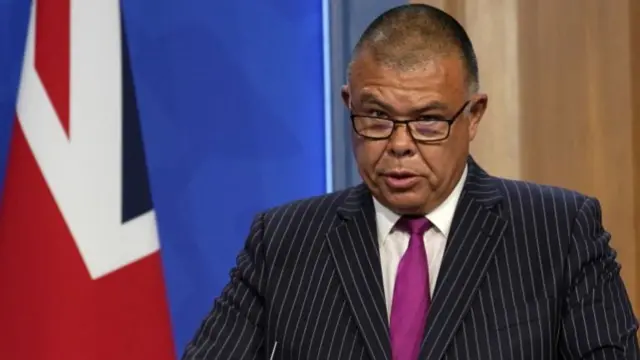 Image source, PA Media
Image source, PA MediaJonathan Van Tam says the NHS is not "under anything like" the pressure it was under in February but the knock-on effect of today's unlocking on cases will only be seen in seven to 10 days.
He adds the effect on hospitalisations will not be seen another seven to 10 days after that.
Van Tam says: "We know what puts the pressure on upward is close contact indoors.
"It's indoor things that are the worst things. That's why with the weather as it is now... if there is a sweet spot, it's probably a good place to be right now.
Sir Patrick Vallance adds it's not possible to open up society without cases going up.
"Where we are is where you'd expect to be even with a heavily vaccinated population," Vallance says.
He adds that case numbers will increase further. The models all show if you go more slowly, then the size of the peak will be lower.
Vallance adds daily hospitalisations could get to be "quite a lot higher" than a thousand a day.
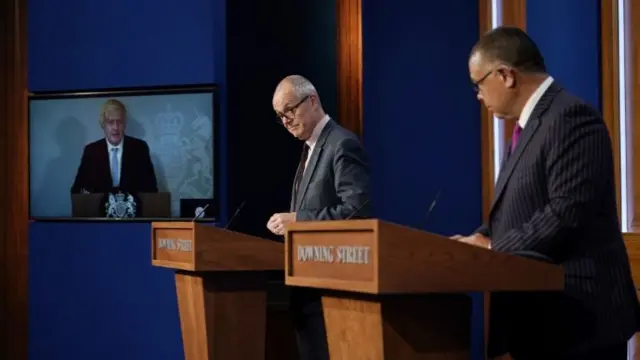 Image source, PA Media
Image source, PA MediaGeorge Parker from the FT asks if we have enough lateral flow and PCR tests to see us through the difficult time ahead.
Sir Patrick Vallance says the whole testing system comes under strain when the demand for it is high.
He says ultimately the level of pressure depends upon how high the rates of infection go.
Moving on to nightclubs, Jonathan Van-Tam says young people have made sacrifices in terms of the kind of socialising they have been able to do and the type of relationships they have been able to have.
But he says being fully vaccinated - while not reducing the risk to zero - is safer.
On exemptions for certain workers from self-isolation, the PM says he doesn't want to extend the system too widely because we have to be cautious.
Analysis
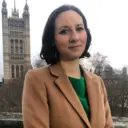 Helen Catt
Helen Catt
Political correspondent
Hang on, now Boris Johnson says he "reserves the right" to make vaccine certification compulsory for nightclubs. That sounds a lot less definite than what he said earlier.
More discussion too of potentially using them in "crowded" places rather than singling out nightclubs in particular.
He seems to suggest he wouldn't want people to have to "produce papers" to go into pubs but that leaves a lot of questions about which venues might count and what the difference is between them.
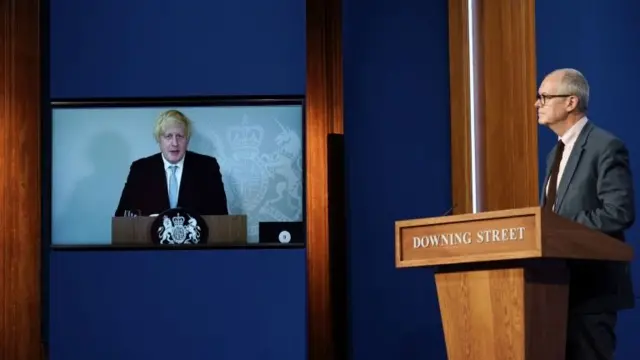 Image source, PA Media
Image source, PA MediaHarry Cole of the Sun asks Prof Van-Tam whether he is worried about crowds in places like beaches, parks and nightclubs.
Prof Van-Tam says: "Our destiny is very largely in our own hands in two ways."
The first is "how gradual and cautious we are" and the second is "how well we can finish the job" of vaccination.
Cole also asks the prime minister why he thought he was "above the rules" after he was told to self-isolate.
The question comes after No 10 initially said the prime minister and chancellor would not isolate after contact with Health Secretary Sajid Javid, who has tested positive for coronavirus, and would use daily testing instead.
The PM says he "absolutely didn't think that".
Asked whether people would have to show documentation to buy drinks in pubs this year, Johnson says: "I don't want to get into a situation where people are asked to produce papers to go anywhere... so I certainly don't want to see passports for pubs."
But he adds: "We reserve a right to do what's necessary to protect the public."
Next up, Times Radio asks when we will see the peak of infections during this wave, and how large it will be.
The timing of the predicted peak is uncertain, says Sir Patrick Vallance.
He adds some models have it appearing in August, while others have the peak coming in August, going down and then back up again.
But most models show a peak or plateau in August, Vallance says.
Ideally the cases will start to come down in September, he concludes.
Prof Jonathan Van Tam agrees there is a lot of uncertainty about when the peak will be - and this is because when the peak arrives and how large it is depends largely on human behaviour over the next few weeks.
So, if people do not proceed with caution, we will see a larger peak, he says.
"It is literally in the hands of the public," Prof Van Tam adds. "That doesn't mean you can't have fun... but gradually and cautiously please."
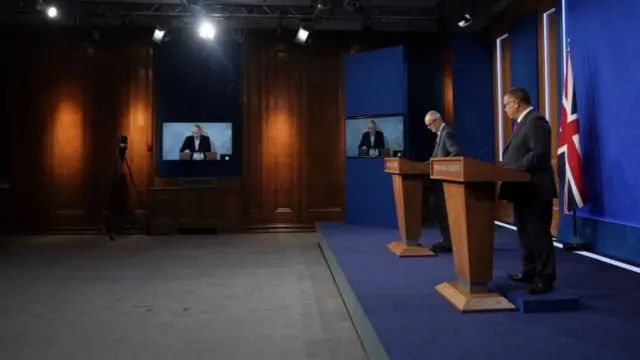 Image source, PA Media
Image source, PA MediaThe BBC's Fergus Walsh asks the prime minister whether he was giving people an ultimatum to get vaccinated or be denied entry to venues.
The PM says young people have been "heroic" throughout the pandemic, saying: "We've got to make sure we allow that generation to bounce back."
"One thing that would really help is if we could continue to reduce the time that we're all living in this pandemic," he says.
"What we're saying is 'Come on folks this is it, you won't regret it.'"
Walsh asks how much concern there is about "superspreader" events.
Vallance says venues such as nightclubs "are a focus for potential superspreading events" and that has been the case in the Netherlands and Israel, where nightclubs reopened.
He says he expects there will be an increase in cases and outbreaks related to specific nightclubs and urges people to get vaccinated.
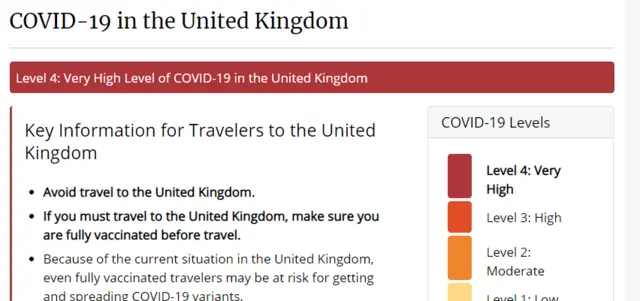 Image source, CDC
Image source, CDCThe US Centers for Disease Control and Prevention is warning Americans against travelling to the UK amid a surge of Covid cases in the country.
The UK has now been raised to the highest threat level - Level 4: Very High, external, in a CDC travel notice.
The US health authority also issued the following recommendations:
The CDC warns that, because of the current situation in the UK, even fully vaccinated travellers may be at risk of getting and spreading Covid-19 variants.
Dan Hewitt from ITV asks, with so much uncertainty over infection rates and hospital admissions, won't the roadmap out of lockdown have to be reversed?
The PM says he "hopes" it is irreversible but he can't guarantee that and "we have to be humble in the face of nature".
There could be a new variant of the virus, he says, that we may need to respond to.
We must continue to be cautious, he adds, and everyone eligible for a vaccine must come forward.
Analysis
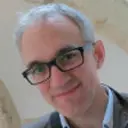 James Gallagher
James Gallagher
Health and science correspondent, BBC News
The dice have been rolled and now we must wait to see if the gamble pays off. We know what will happen only in the broadest terms.
Cases will go up, they will eventually hit a wall of immunity and then come back down again. But will that happen at 100,000 cases a day or 200,000 or more?
Will that lead to unsustainable pressure on the NHS come late summer? We don't know. There is uncertainty within the mathematical models. They range from everything should be fine to predicting the need to re-introduce restrictions.
Small changes in estimates of vaccine effectiveness can shift the forecasts. As can how we act. The more worried and cautious we are about the months to come the better things are likely to be.
And the more relaxed and carefree we are the more likely we are to have a problem. Ultimately it is human life that is at stake. But vaccines, which are cutting deaths by more than 90%, mean the stakes are lower than they've ever been.
David from Wiltshire asks how many people testing positive have been vaccinated.
The PM says the number of people testing positive who are fully vaccinated is rising but that does not mean the vaccine is not working.
Sir Patrick Vallance says 60% of those admitted to hospital have been fully vaccinated but he stresses this is "not surprising" as most people have now been vaccinated.
Vallance goes on to say the vaccines are most effective at stopping severe disease - and while they do help prevent you get it in the first place, that is not their main aim.
Toby from Sutton Coldfield asks the first question from members of the public. He says he has been living abroad and has been fully vaccinated but can't get a Covid pass now that he is back in the UK.
The PM says the UK is working with countries around the world to understand the efficacy of their vaccines.
Jonathan Van-Tam says if you have had a good vaccine from a good country then you should get just as much protection.
There is a lot of work going on to sort this out he says.
Analysis
 Helen Catt
Helen Catt
Political correspondent
A big change there: the prime minister confirms vaccine passports will be compulsory for clubbers from the end of September, without an option to show a negative test instead.
The government had said it could make proof of vaccination mandatory but now it's saying it definitely will, regardless of what happens over the coming weeks.
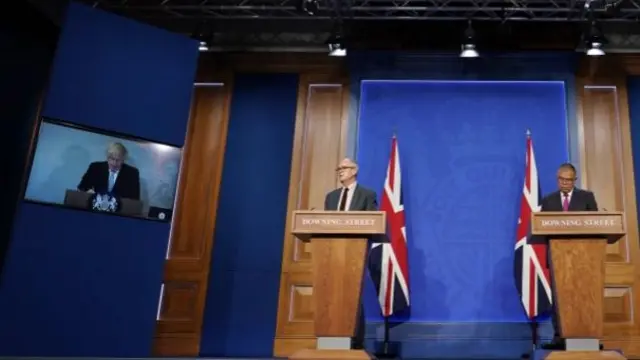 Image source, PA Media
Image source, PA MediaJohnson says there are still 35% of 18-30 year olds who are completely unvaccinated
"Some of life's most important pleasures and opportunities are likely to be increasingly dependent on vaccinations," he says.
He says the list of countries that require travellers to be fully vaccinated "as a condition of quarantine-free travel" is "likely to grow".
And he says is concerned by "the continuing risk posed by nightclubs".
"Nightclubs need to do the socially responsible thing and make use of the NHS Covid Pass as a means of entry," he says.
And he confirms that by the end of September the government plans "to make full vaccination the condition of entry to nightclubs and other venues where large crowds gather".
Sir Patrick Vallance - chief scientific adviser to the government - is up next.
He says the number of people testing positive in the UK is rising sharply.
He adds that currently we're "quite close" to the size of the winter wave of infections "and it will raise further".
He says there are four major risks stemming from high-case numbers: hospitalisations, long Covid, new variants and the number of people self-isolating.
He also adds that the testing programme may become "very stretched".
Vallance points out that deaths are increasing and we will see an increase over the next few weeks, with daily deaths moving into the hundreds
The PM says he hopes the wall of immunity built up by mid-August, when the country moves to a system of testing rather than isolation for the double vaccinated, will be "even higher".
In the meantime, to protect crucial services, a "very small number" of fully vaccinated critical workers will be able to leave isolation, he says.
Read more on the pilot testing scheme to avoid isolation here.
It is "essential" to keep up the system of test, trace and isolate, the PM says.
He says he knows it is frustrating for those who have been "pinged".
"I'm afraid that the continuing sacrifice of this large minority, those of us who have been asked to isolate, remains important," he says.
"At this stage, its simply a consequence of living with Covid and of opening up when cases are high."
Boris Johnson says, with cases increasing, some people would "rather we'd waited weeks or months" to ease restrictions.
He says it is "right to take this step now".
"If we don't open up now, then we face a risk of even tougher conditions in the colder months," he says.
"There comes a point after so many have been vaccinated when further restrictions no longer prevent hospitalisations and deaths but simply delay the inevitable."
He adds: "We have to ask ourselves the question, if not now, when?"
The prime minister has started speaking.
Grab your popcorn and stay tuned for updates.
Away from Zahawi's statement in the Commons, Prime Minister Boris Johnson is about to hold a press conference from Downing Street.
He won't, however, be there in person as he is self-isolating. He will appear virtually.
Our attention is now turning to that, so stick with us for updates.